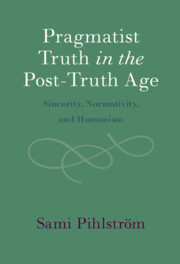Book contents
- Pragmatist Truth in the Post-Truth Age
- Pragmatist Truth in the Post-Truth Age
- Copyright page
- Epigraph
- Contents
- Acknowledgments
- Introduction
- Chapter 1 James’s Children?
- Chapter 2 Religious Truth and Pluralism from a Pragmatist Point of View
- Chapter 3 Around or through Kant?
- Chapter 4 The Will to Believe and Holistic Pragmatism
- Chapter 5 How Is Normativity Possible?
- Chapter 6 Pragmatic Agnosticism – Meaning, Truth, and Suffering
- Conclusion
- References
- Index
Chapter 6 - Pragmatic Agnosticism – Meaning, Truth, and Suffering
Published online by Cambridge University Press: 14 September 2021
- Pragmatist Truth in the Post-Truth Age
- Pragmatist Truth in the Post-Truth Age
- Copyright page
- Epigraph
- Contents
- Acknowledgments
- Introduction
- Chapter 1 James’s Children?
- Chapter 2 Religious Truth and Pluralism from a Pragmatist Point of View
- Chapter 3 Around or through Kant?
- Chapter 4 The Will to Believe and Holistic Pragmatism
- Chapter 5 How Is Normativity Possible?
- Chapter 6 Pragmatic Agnosticism – Meaning, Truth, and Suffering
- Conclusion
- References
- Index
Summary
One of the key issues the pragmatist (e.g., Jamesian) philosopher of religion today needs to consider is the truth-aptness of religious language. While the pragmatist conception of truth (explored in the early chapters of the book, in particular) yields an important perspective on this topic, and while the "philosophical-anthropological" discussions of the will to believe and normativity crucially illuminate our pragmatist understanding of the practices of truth-seeking, especially their diversity and individual variability, this chapter draws attention to our inability of fully determining whether religious language is "truth-apt" and cognitively significant in any standard sense. A meta-level form of "meaning agnosticism" is developed, with some historical references to the early development of analytic philosophy of religion. This agnostic position acknowledging human finitude and fallibility is, furthermore, applied to the opposition between theodicies and antitheodicies, one of the key issues of (pragmatist) philosophy of religion. Agnosticism and antitheodicism are ultimately argued to be based on pragmatist transcendental humanism.
Keywords
- Type
- Chapter
- Information
- Pragmatist Truth in the Post-Truth AgeSincerity, Normativity, and Humanism, pp. 178 - 217Publisher: Cambridge University PressPrint publication year: 2021

